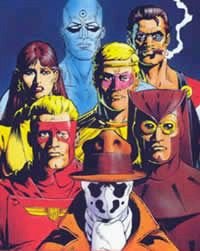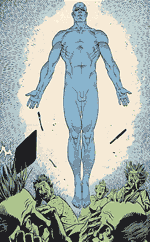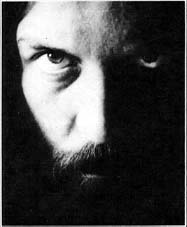 Last week we brought you part one of our exclusive interview with Watchmen director Paul Greengrass (click here to read that if you missed it). The response has been tremendous – and overwhelmingly positive! I think that a lot of fans have come to understand that Paul isn’t some MTV director who is going to go for a lowest common denominator film. I think the final parts of this interview are only going to cement the fact that Paul is one thoughtful and smart guy who holds the best parts of this property close to his heart.
Last week we brought you part one of our exclusive interview with Watchmen director Paul Greengrass (click here to read that if you missed it). The response has been tremendous – and overwhelmingly positive! I think that a lot of fans have come to understand that Paul isn’t some MTV director who is going to go for a lowest common denominator film. I think the final parts of this interview are only going to cement the fact that Paul is one thoughtful and smart guy who holds the best parts of this property close to his heart.
Today is part 2 of 3, and Paul talks more about the unique challenges facing an adaptation of Alan Moore’s classic work, as well as some of the surprising influences he will be bringing to the film. The positive response has also led us to speeding up the installments, so look for the final part of the interview Wednesday!
Q: There are a lot of things that are tricky, especially getting across some of the book’s imagery. Take for instance Dr Manhattan – his nudity is important to his character, but how will you possibly get away with a hundred foot tall naked blue man on screen? What thought have you put into that?
Greengrass: Some. Not all of our solutions are here yet. It’s a matter of getting the American football team through the door at the same time. What is absolutely imperative is that we have Dr. Manhattan and that we dramatize his powers and that we have a character who people that are familiar with the comic book will recognize straightaway as Dr. Manhattan. We have to be authentic to that vision. And we will be. Now if you’re asking me is he going to be stark buck naked from top to bottom from the first frame to the last, actually in the graphic novel he’s not either – he has a rather natty suit on some of the time.
Q: And in some of the flashbacks he has a superhero outfit on.
Greengrass: Entirely. But what I don’t think we will be doing will be a little pair of jockey shorts. That’s never been up to discussion.
In many ways the Dr. Manhattan of the graphic novel – when I read that story now, I find myself feeling that Alan Moore was many, many things but one of the things he was is a prophet. There’s an odd kind of a mismatch in the graphic novel between the world where there is this great power underpinning it called Dr. Manhattan and the bi-polar world. When you look today, we live in a uni-polar world. In many ways we live more in Dr. Manhattan’s era, I think, then we did then.
 Q: That’s interesting. The Soviets in the book had no comparable Dr. Manhattan.
Q: That’s interesting. The Soviets in the book had no comparable Dr. Manhattan.
Greengrass: This is my take on it, if you like. When the Wall came down in 1989, which was the event that I think more than anything else signaled an abrupt change in the world as I had understood it in my life to the world that we now live in. It was that collapse from a bi-polar world to a uni-polar world, where there was only one great titanic power in the world, and the rest of us whether you’re British or German or Japanese or whatever you are you are but pygmies to this colossal power in the world called America. In many ways it’s one of the things that makes me feel that Watchmen speaks to us today in a way because the character of Dr Manhattan – that strange mixture of detachment and engagement, that loneliness if you like, that inability to make the right move is very interesting when you think about the world today. Ultimately Adrien’s plan, vis a vis Manhattan, is an interesting thing in the world today. Manhattan is a very key character.
Q: Is Manhattan your favorite character? Do you have a favorite character?
Greengrass: You know, I honestly don’t. I think one of the main things that makes Watchmen very special is that it’s WatchMEN. It’s not Spider-MAN. It’s not BatMAN. It’s not SuperMAN. It’s WatchMEN. It’s this ensemble of compelling characters with human depth and yet archetypal definition that gives it – that’s’ the genius, I think, of the piece. In a funny way I don’t have a favorite character, they’re all magnificent characters. And they all must have their moment in this film.
I suspect – I know it will be through the next twelve months, right up to the moment we lock this picture, it will be a large part of our business: rendering the balance between those characters so you keep it balanced yet when you’re in a story you know why you’re in it.
Q: That’s interesting because I know that you’re in the “getting the football team through the door” phase, but are you giving thought to the idea of how you’re going to cast the picture in regards to giving every character their moment? Are you looking for bigger names for some of the roles, or are you looking for more of an ensemble?
Greengrass: The honest truth is that we’re trying to formulate a strategy at the moment. There are a number of ways you can go with casting this film. What’s imperative is that you create balance, you create an ensemble. That’s the fundamental thing. But there are a lot of ways you can go. We are at the stage of kind of looking at how that might work, and part of looking at how they might work is analyzing how that community see it. It’s very interesting to me when you follow those [message board] threads, people have suggestions and you say, “No I don’t think that’ll work,” but you know there are many suggestions that I think are fantastic. Of all the footballers not yet come through the door, that’s one that has not come through the door.
Q: Has the footballer come through the door that has led you to decide how old to cast? In the novel most of the main characters are in their 30s and 40s, plus there are even older parents. Are you going to cast in that age group or do you want to skew younger to grab a younger audience?
Greengrass: I think that we will be not far off. I think that what’s absolutely essential in telling the story of Watchmen that you protect as it were the three generations. I say that loosely, I don’t mean it literally. But it does seem to me that there is the group of characters in the Minutemen, who rose and fell. Within that group you have Sally and the Comedian. Then you have really three characters who emerge at a later stage: Rorschach, Manhattan and Adrian. And then you have Dan and Laurie who are a bit younger, almost children of the Minutemen. They are a little younger again than Rorschach, Manhattan and Adrian. That’s the thing we need to preserve in our casting, that understanding you have of the relationship between those three generations – they’re not strictly generations, but I think  you see what I’m talking about.
you see what I’m talking about.
Q: The novel is so dense. There’s no way that you could, within a two hour movie, get every element of that world across. What are the elements of the Watchmen world that you want to get across?
Greengrass: I’m not sure that I agree with the first part. I don’t think you can fully reflect every single last detail, you’re right about that. But a film works in a different way, I think, to the plates of a graphic novel. In its way I think you can suggest depth of a different kind. I absolutely do want, intend and believe that we will bring to screen a Watchmen world that has depth and allusiveness. That it has that kind of richness and texture of the graphic novel.
What I think is very, very important is that the world be real. That it be the world that we understand is the world we’re living in, rather than it being a kind of romanticized Gotham City. I think a second thing that’s important is that the world unfolds in a manner consistent with our world outside. When the novel came out that whole view of the world where Nixon got elected again and again, Woodward and Bernstein got assassinated, G Gordon Liddy was a trusted advisor in the White House – that was a brilliant conceit. It was not the world we lived in but it was the world we might have lived in. A fact that we must and will get across in this film.
I think the second thing that’s really important is that when you sit inside that world our ensemble of caped crusaders, that you understand that these are human characters, flawed characters. That they’re not superheroes – or that only one of them technically really is, Manhattan. It’s that concept that you have a human drama that involves this cast of characters and that you understand where they’ve come from. That this is not just some casual thing that they do, they do it because they’re compelled.
There’s something about it, in an odd way, that reminds me of One Flew Over The Cuckoo’s Nest, both the novel and the film. You’re looking at a world that is of our world, but yet is very separate. You look at Diane Arbus’ photographs and you have something of the same quality. I think that therein lies where we need to go with Watchmen as a piece of drama.
Q: I think that there are three elements of the novel, and you’ve hit on two so far. There’s the upfront story element, which is the murder mystery. Then there’s the political aspect. But the third element is that the novel serves as a deconstruction and critique of superheroes and comic books. Will you be delving into that?
Greengrass: Yes, we absolutely will do, and you are absolutely right, that’s the third element. I think it’s important that we do it and that our audience, particularly the Watchmen community, know that it’s being done and enjoy that it’s being done and that it’s done on a sophisticated level. There you have, in the graphic novel, where the real depth and texture in it, there’s a limit to how much we can do. But I think that we will do enough to keep all three of these elements in play together, working together in appropriate balance.
When you said the political element, I always call it the footsteps to Armageddon. Because I think that element is actually incredibly exciting. I say that because as we’ve come together over the last few weeks I’ve asked my team to watch a BBC drama made at about the time that Watchmen came out called Threads. It was one of those unique events you can only have in a country like Britain on television, where everybody tunes in to watch the same thing at the same time. Threads was a dramatization of what would happen if there was a nuclear conflict in Britain now. And I’m talking 1986ish when it came out.
It was responding absolutely head on to the same sort of paranoia that begat Watchmen. But it did it not in comic book form, but in straightforward – imagine that in ‘61, ‘62 it was the Cuban Missile Crisis, but in the mid to late 80s what would be scenario that got them to the Missile Crisis and then let’s imagine that they couldn’t get out of it. I hadn’t seen it in 20 years. I remember it as one of those seminal audience moments in my life of watching something where I was horrified, compelled, just could not lift my eyes from the screen. I was watching something that was speaking to me about what was happening in the world. It was actually a very beautiful screenplay about a young couple in Sheffield, moving into their first apartment together. It was full of youthful hope. I think she was pregnant. It was set against this gathering international crisis that nobody took any notice of until these individual dramas got blown apart by this terrible cataclysm.
A lot of it was told in bits of news footage and newspapers. Told in the exact same way that Alan Moore tells it in Watchmen. It’s just at the heart of his story is this caped crusader murder mystery and at the heart of Threads is this small domestic kitchen sink love story. When I started Watchmen a couple of months ago One Flew Over the Cuckoos Nest was in my mind and so was Threads. I watched it and of course the special effects now – it was a small television film and there were no computer special effects. That bit didn’t work. But the first forty-five minutes I found spoke to me today just as they had done two decades ago. Showing the way the world can turn can be utterly compelling, and ask you questions. That why I believe passionately that we can make this thing work in two hours because we will have a piece that will speak to our fears. And also show us some ways to deal with our fears. In some places in Watchmen that’s there too.
 Q: Alan Moore has been very vocal about not being happy with the movie adaptations of his work. Have you spoken to him about this, or tried to speak to him, or even just hope to speak to him?
Q: Alan Moore has been very vocal about not being happy with the movie adaptations of his work. Have you spoken to him about this, or tried to speak to him, or even just hope to speak to him?
Greengrass: I hope to, I would love to. I intend to try. In many ways he’s made his position plain about the films. They’re not my films. I wasn’t there. I wasn’t at the scene of those accidents. All I can speak to is where I come from, where I come to Watchmen from and what I would like to do. I couldn’t presume to tell Alan Moore it’s going to be great. It’s exactly the same thing as when I sat down with families who lost loved ones in the bombing at Omagh or who lost loved ones in Bloody Sunday. In the end you can’t say to people like that, “Listen, I’m going to make this film and it’s going to be great!” You can’t say that. All you can say is, “I would like you to give me the chance to show you what I have done and you judge me on that.” That’s all you can ask. You can ask to be judged on what you tried to do. You can’t ask for endorsement in advance, it seems to me. You have to earn respect with what you do.
That is the same with the Watchmen community. A lot of people out there will be skeptical about us, will doubt that it can be done, will worry about how we will do it. All I can say in all honesty and humility is, I understand that. I believe with a passion that we can do it, I believe with a passion that I was making a contribution in my country as Alan Moore was in his way at that time, but I was dealing with a lot of the same material and ideas at that time. I beg only that you judge me when I’m done, as I’m sure I will be.
Wednesday: The finale! Paul talks about the Jason Bourne connection and the astonishing ways Watchmen is more relevant than ever.